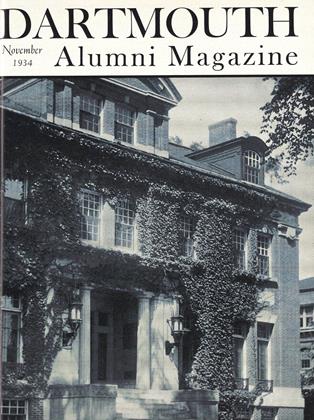One of the big arguments of the two latter groups is, of course, that the "power-houses" go after individual "big-shots" and thus have discord within, and that their house is unified in spirit and is getting a delegation that will become a perfect bit of harmony and cooperation all of which is so much hot-air.
Dartmouth men have absolutely no conception of the intense fraternal bonds that united Greeks in brotherhood in years past—and that still do today in universities and colleges in the West and South. Their ignorance of true fraternity spirit is colossal. A favorite story that a senior (who got it from a Mid-West fraternity brother) brings back from his summer vacation, relates how a chapter in the Mississippi Valley censored one of its members for being seen too often with a friend of his who belonged to another house. Dartmouth men think this funny and preposterous. The Dartmouth attitude can be illustrated by the fraternity men who laugh when the chapter tries to fine them for not coming to meetings.
Fraternity duties at Hanover are carried out, for the most part, grudgingly, and the brothers who actually enjoy their rushing activities are few and far between. Most of them are cajoled into going around to see rushees only after repeated pleas from the rushing chairman that "they have to do something for the House."
What it all will lead to is, as we have stated, a prediction upon which we hesitate to commit ourselves, but we do feel secure in saying that Dartmouth fraternities have reached a state that is both unhealthy and unstable. Loyal Dartmouth Greek alumni may bemoan and rue the day, but a change is bound to come, just as it has come at Harvard, and is, at the present time, coming at Yale.
 View Full Issue
View Full Issue
More From This Issue
-
 Article
ArticleGRADUS AD PAMPASSUM
November 1934 By The Editors -
 Article
ArticleHANOVER BROWSING
November 1934 By Herbert F. West '22 -
 Class Notes
Class NotesClass of 1930
November 1934 By Albert I. Dickerson -
 Class Notes
Class NotesClass of 1934
November 1934 By Martin J. Dwyer Jr. -
 Class Notes
Class NotesClass of 1929
November 1934 By F. William Andres -
 Class Notes
Class NotesClass of 1914
November 1934 By Edward Leech
Milburn McCarty IV '35
-
 Article
ArticleTHREE TYPES OF HOUSES
November 1934 By Milburn McCarty IV '35 -
 Article
ArticleTHE UNDERGRADUATE CHAIR
February 1935 By Milburn McCarty IV '35 -
 Article
ArticleNO "CAMPUS OPINION"
April1935 By Milburn McCarty IV '35 -
 Article
ArticleFRATERNITIES PROBED
April1935 By Milburn McCarty IV '35 -
 Article
ArticleWEEK-ENDING
April1935 By Milburn McCarty IV '35 -
 Article
ArticleAVE ATQUE VALE
April1935 By Milburn McCarty IV '35








